7 Section 1-7: The Verb “haben”
1–7: The Verb haben—to have
You have already learned how to conjugate the verb sein, to be. The next verb you will learn is haben, to have. Both haben and sein are arguably the two most important verbs in the German language. Not only are they very common in everyday speech, but they will also be used in future chapters to form the past tense.
Here is the verb haben conjugated for all forms. It is slightly irregular in the du and er/sie/es, so you will need to memorize the conjugation.
|
ich habe |
wir haben |
|
du hast |
ihr habt |
|
er/sie/es hat |
sie/Sie haben |
- Ich habe im September Geburtstag.
- Du hast das Buch.
- Er hat morgen Biologie.
- Sie hat das Papier.
- Wir haben Psychologie am Montag.
- Ihr habt eine Katze.
- Sie haben im März Geburtstag.

Use this song to help you learn the irregular conjugation of haben:
Video. Conjugate “haben.” Watch the video to see me reteaching this.
In the box below is a list of classes that you may have right now. Most of them are very similar to English.
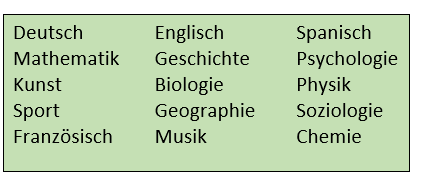
Ex. A: Kurse. Talk with a partner about your schedule for today (heute) and tomorrow (morgen). ![]()
A: Welche Kurse hast du heute?
B: Ich habe heute __________ und ___________.
A: Welche Kurse hast du morgen?
B: Ich habe morgen __________ und ___________.
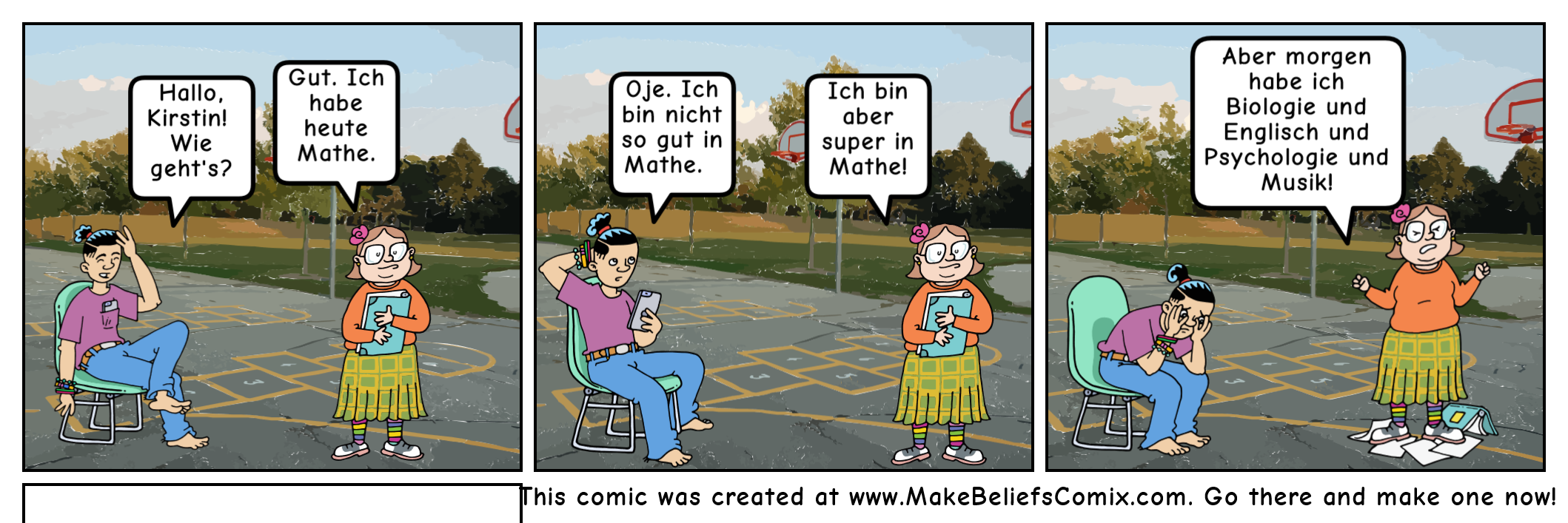
Days of the Week
You can also use the days of the week with the verb haben to describe your schedule.
Notice that the days of the week have certain patterns.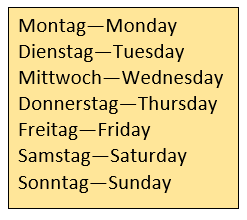
- All but Mittwoch end in the word Tag, day.
- Mittwoch literally means “midweek.”
- Where we see the letters “t” or “th” in English, there is often a “d” in German. →Dienstag (Tuesday); Donnerstag (Thursday)
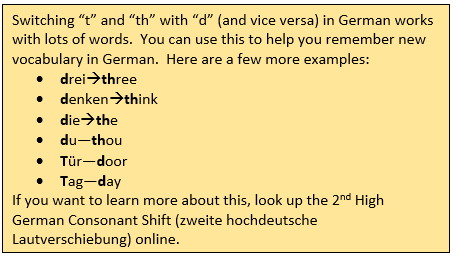
Listen to Wikimedia user Christoph (Attribution-Share Alike 3.0 Unported) pronouncing the days of the week.
To say that you do something on a certain day, use the preposition am before the day.
am Mittwoch→on Wednesday
am Samstag→on Saturday
am Dienstag→on Tuesday
Ex. B: Wann hat Philipp Chemie? Answer the questions about Philipp’s schedule in complete sentences, using the verb haben and the days of the week.
|
Montag |
Dienstag |
Mittwoch |
Donnerstag |
Freitag |
Samstag |
Sonntag |
|
Biologie Musik |
Deutsch Chemie Deutsch |
Biologie
|
Deutsch Chemie Musik |
Biologie Deutsch |
Spanisch |
frei |
Beispiel: Wann hat Philipp Spanisch?
→Philipp hat am Samstag Spanisch.
- Wann hat Philipp Biologie?
- Wann hat er Chemie?
- Wann hat er Deutsch?
- Wann hat er Spanisch?
- Wann hat er Musik?
- Wann hat er frei?
- Was hat Philipp am Montag?
- Was hat Philipp am Dienstag?
- Was hat Philipp am Mittwoch?
- Was hat Philipp am Donnerstag?
- Was hat Philipp am Freitag?
- Was hat Philipp am Samstag?
- Was hat Philipp am Sonntag?
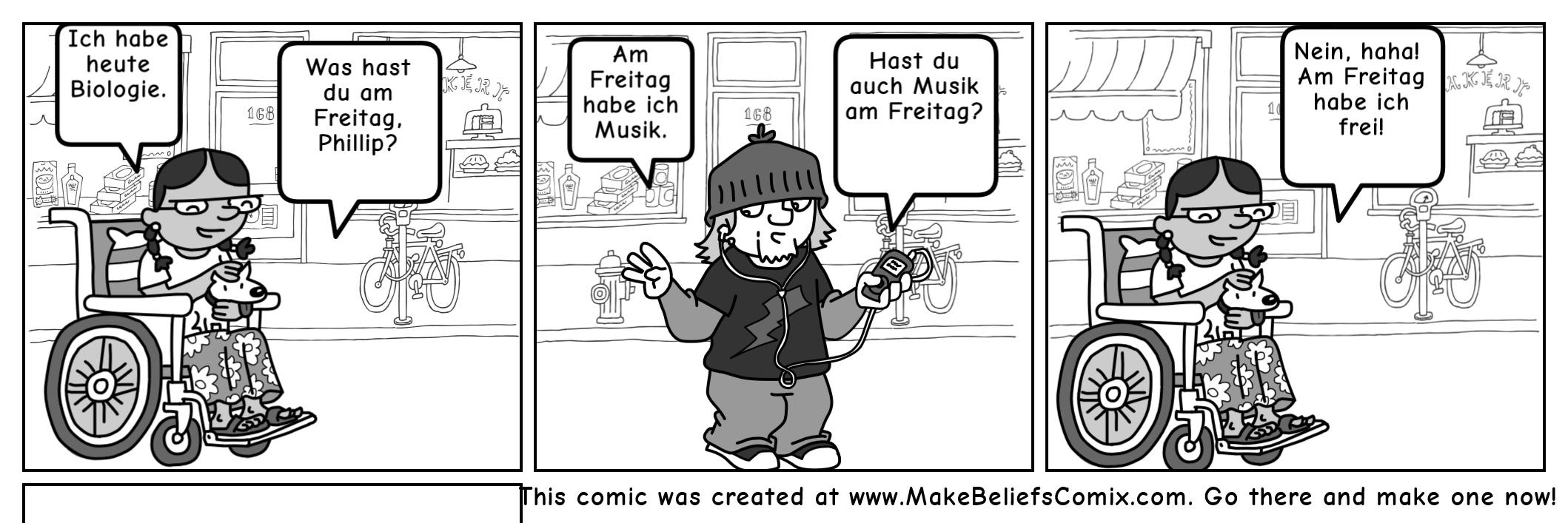
Ex. C: Now answer the questions about your own schedule in complete sentences. If you don’t have anything on a certain day, you can always say, “Ich habe frei.”
- Was haben Sie am Montag?
- Was haben Sie am Dienstag?
- Was haben Sie am Mittwoch?
- Was haben Sie am Donnerstag?
- Was haben Sie am Freitag?
- Was haben Sie am Samstag?
- Was haben Sie am Sonntag?
- Wann haben Sie Deutsch?
Ex. D: Ask a partner the questions from the exercise above. Now write a brief paragraph about his/her schedule in third person.
EXTRA PRACTICE: Go to Germanzone.org’s website for extra practice with the verb “haben.” Don’t worry about all the words you may not know for now; just look at the subject to conjugate the verb.
- https://www.germanzone.org/verb-haben-present-tense-1/.
- https://www.germanzone.org/verb-haben-present-tense-2/.
Deutsche Musik! Want to practice the days of the week through music? Click on the video to hear the song Jeden Tag (2015) by Nena. In the chorus, she repeats the days of the week beginning with Montag. (The week begins on Monday in Germany.)
Songtext: https://genius.com/Nena-jeden-tag-lyrics
Ex. E: Video. Easy German: Days of the Week.
The video shows interviews with Germans talking about their weekly schedules. Using what you learn in the video through subtitles, try to figure out what the following new words mean.
- arbeiten
- Bergfest
- Sport
- Flohmarkt
- Wasser
- Kino
- Frühstück
The months of the year are very similar in German.

Listen to these being pronounced by Wikimedia user Christoph, Creative Commons Attribution-Share Alike 3.0 Unported.
Or learn them through this song:
Note a few differences in pronunciation:
- The letter “j” in German is pronounced like a “y” in English.
- The letter “ä” in German is pronounced like the first “e” in the word “ever.”
- In the word “August,” the 2nd syllable is stressed: au-GUST
Watch out!
So far, you have seen two very similar words in German that both mean “in”: in and im. For now, ONLY use im with months and seasons. In a later chapter, you will learn the difference between these two words.
To say that you do something in a certain month, use the word im in front of the month.
- im Januar—in January
- im Oktober—in October
- im Juli—in July
Wann hat Ingrid Geburtstag? When does Ingrid have a birthday?
Sie hat im September Geburtstag. She has a birthday in September.
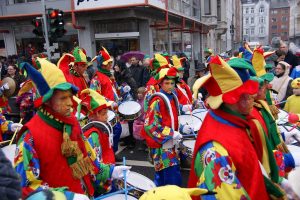
Karneval ist im Februar oder im März.
Ex. F: Geburtstag. Ask your classmates when they have birthdays.
A: Wann hast du Geburtstag?
B: Ich habe im ____________ Geburtstag.
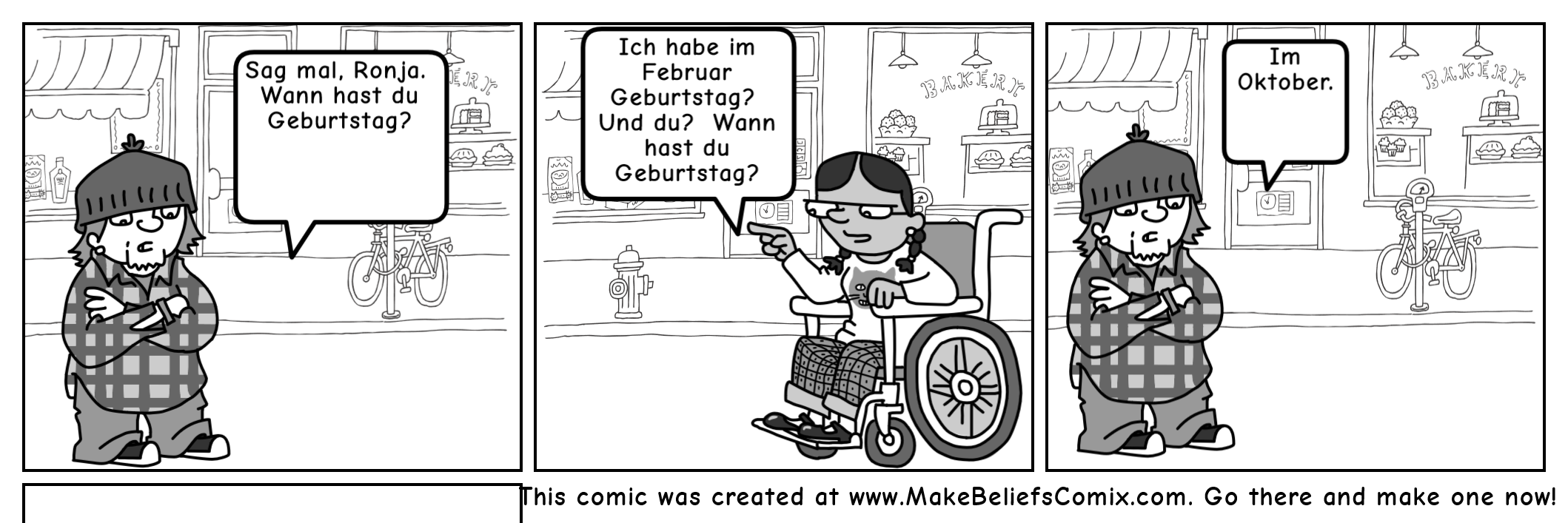
Quick review of months and days, courtesy of Sabine Milz.
Quick review of the verbs haben and sein with Dr. Claudia Kost’s (University of Alberta) verb activity:
EXTRA PRACTICE with days, months, and seasons.
Video. Easy German: Haben. Watch the video to see lots of examples with the verb “haben” in real life.
EXTRA PRACTICE: Need more practice with haben? Click the link below for some online practice that will check your answers automatically. There may be some words in the sentences that you don’t understand, but don’t worry about those for now. All you need to do is to look for the subject of the sentence and conjugate the verb for that.
CHALLENGING PRACTICE: For those who wish to go beyond what we have learned, these exercises will provide you with a challenge. You will be conjugating both sein and haben. Additionally, you will have to choose which of the verbs is more appropriate in each sentence. As always, the site will grade your answers and give you feedback.

